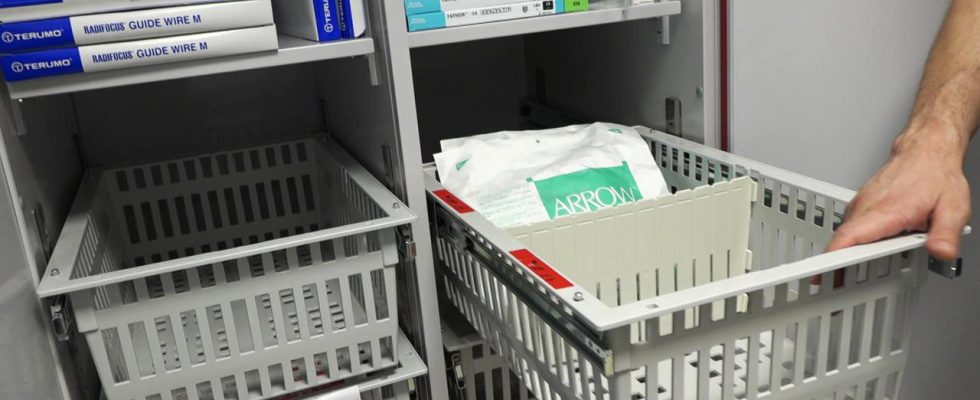background
It is actually intended to ensure more safety in the healthcare system. In practice, a new EU medical device regulation means that doctors are increasingly lacking tailor-made solutions.
Stephan Schubert saved the life of the little patient lying on the operating table three months ago. Levi (Name changed by the editors) was born with a severe heart defect: he only has one ventricle. Immediately after birth, the doctors at the Bad Oeynhausen Clinic had to place an artificial connection between the newborn’s lungs and heart.
Now Schubert wants to make sure that everything works correctly and that the size of the connection is still correct. He has to guide an examination catheter through an access in the groin to the heart; through vessels that are just two millimeters thick.
Intervention more risky than actually necessary
A delicate procedure, anyway. But it is even more risky than necessary because the right material is missing, explains Schubert: “I would actually need a diagnostic catheter with a so-called balloon at the front. But they are not available at the moment. The disadvantage is that I have to use one that is not so protected work in the heart and could injure the heart or blood vessels.”
Improvising and having to accept higher risks: This all too often shapes the everyday lives of many doctors, says Schubert. “We actually want to achieve the best result with the best material, and we are increasingly missing that. We always have to rethink things in some way. Acutely.”
Stricter Admission process – with more bureaucracy
The reason for the shortage is an EU regulation that had a noble goal, but, in the opinion of doctors and manufacturers, went beyond it: the EU Medical Device Regulation or “Medical Device Regulation”, or MDR for short. This should actually ensure more safety – through a stricter and more complex approval process, both for new medical products and for those that are already on the market.
There has been criticism of the regulation, which has been in force since 2021, for a long time. In practice, however, it is now becoming increasingly clear that the fears have become reality.
The Erbe company, for example, is one of the big players in the industry. The Tübingen company has been producing surgical devices and instruments for over 170 years. The new EU regulation has resulted in Erbe claiming to have withdrawn products with a sales volume of around 20 million euros from the market in the past three years. The reason, according to the company: too much bureaucracy, too much personnel effort, too high costs for re-approval.
Europe is no longer the first choice
And that’s not all. The European market is no longer the manufacturer’s first choice for new products, says sales manager Marcus Felstead: “It used to be automatic that all companies in Europe had their products approved in Europe first. Now for us, that the innovative, newly developed products in particular are first brought onto the market in other countries before they benefit patients in Europe.”
If any. Initial approval in the USA does not replace the new, complex approval process for the EU. According to a current study by the DIHK, the Medical Mountains network and the industry association Spectaris, one in five companies is now switching to other markets with medical technology innovations. According to the companies, there is no equivalent alternative on the market for almost 20 percent of the coated products.
Special problem with niche products
The situation is particularly critical with urgently needed niche products, which are only produced in small quantities but which can often be extremely important for affected patients – provided they have approval. Especially for smaller manufacturers of such niche products, the new approval process is often no longer financially viable.
The head of a company who wishes to remain anonymous reports to tagesschau.dethat three urgently needed products for pediatric cardiology have been fully developed. But these will be allowed in the USA – not in Europe. Approval in the EU simply doesn’t make sense: “The costs would run into the millions. But such niche products only bring in a few hundred thousand euros a year. We would even have to go on top of that, and a smaller company like us simply can’t afford that afford.”
Improvements required
Critics have been warning about exactly such situations for some time. And politicians are also starting to rethink things. MEP Peter Liese from the CDU, who was actually a supporter of the stricter approval process, is calling for improvements: “You used to need one file folder, now you need ten, and I think you should actually get by with two.”
As long as the procedure doesn’t change, doctors like Stephan Schubert will have to continue to improvise in everyday clinical and practice life: “Every day we have to say: Do we still have that? Can we do that? And that makes me sad – that “We haven’t heard that those responsible in the ministries and in the EU have always said: It’ll work out somehow.”
After all: When asked, the EU Commission announced that it is now working on new guidelines specifically for niche products. The Health Committee of the European Parliament is currently in discussions with the Director General of Health on the topic. One thing is clear: this process will take time. However, quick decisions from Brussels may be vital to survival, especially for patients like little Levi in Bad Oeynhausen.

